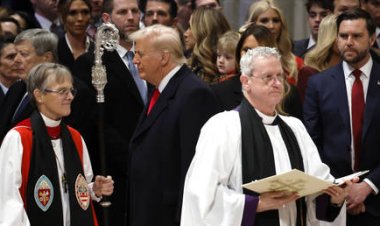California Democrats Propose Unemployment Benefits for Noncitizens; Decision Rests with Gavin Newsom
Alternatively, the governor might approve a plan to provide unemployment benefits to noncitizens.

The Democratic governor is under mounting pressure from within his party to prioritize progressive goals, while Republican leaders are asserting that a hypothetical President Kamala Harris would allow liberals to govern unchecked in Washington, much like they've done in California. Alongside these dynamics, Newsom, who cannot seek re-election, is focused on solidifying his legacy and responding to critics who argue that he is prioritizing national issues over local governance.
The governor's office has indicated that the proposal “will be evaluated on its merits” before the Sept. 30 deadline for legislative sign-offs. However, the finance department has expressed reservations about an earlier iteration of the bill, citing funding issues. Newsom has cautioned lawmakers in the Democratic-controlled Legislature to avoid “virtue signaling” in an election year.
“Is it veto bait? Sure,” remarked Democratic consultant Andrew Acosta, emphasizing that costs could also justify rejecting the legislation.
Acosta noted, “This governor’s done quite a bit on the immigration side and has been pretty vocal about trying to make California a sanctuary for folks. I don’t know if this bill is going to be the be-all and end-all or somehow used against him, that he’s now anti-immigrant.”
He further added, “Some of these things sound good, but there is a cost associated with them, and we’re in a massive budget deficit.”
The national conservative media has labeled the unemployment benefits proposal as radical, while Republicans in California have characterized this and other legislative efforts, such as a move to ban youth tackle football, as disconnected from the views of many Californians.
Brian Jones, the Republican leader in the state Senate, noted that Newsom is likely considering the national ramifications of his decision. “He’s smart,” Jones said. “He’s the governor of the biggest state in the country. I’ve got to believe he’s thinking about it.”
Progressive Democrat Assemblymember Alex Lee, who supports the bill and has seen other ambitious initiatives blocked by Newsom, anticipates a veto from the governor but acknowledges that Newsom sometimes takes “out of the box” actions.
“From my view, I would say the national discussion is always a factor in whether he signs or vetoes bills on all the issues,” Lee explained.
Importantly, the proposed measure would not automatically provide unemployment benefits to undocumented immigrants. Instead, it would mandate that the state’s Employment Development Department devise a plan for a permanent program offering cash assistance to these workers, who are currently barred from receiving unemployment insurance under state law. The agency has refrained from commenting on the proposal, although it had previously projected in January that the unemployment insurance fund could face a $21 billion deficit by the end of the next year.
The original proposal was scaled back to a study bill towards the end of the legislative session. The initial version would have allowed unemployed undocumented workers to receive $300 weekly for up to 20 weeks, with eligibility limited to those out of work in 2025 and the program phasing out by 2027.
The original Excluded Workers Program included stringent qualification requirements. These included being unemployed for a minimum of one week, working at least 93 hours or earning $1,300 over three months, and providing wage statements, tax returns, or timesheets. Other records, such as evidence of direct deposits or commuting receipts, could also be used to establish employment relationships.
Senator María Elena Durazo, the Democratic sponsor of the bill, defended the measures as essential for public welfare. “Unemployment insurance is a lifeline when disaster strikes,” she stated. “Over 1 million Californians are excluded from unemployment benefits simply because of their immigration status. Yet, taxes on the wages of undocumented workers already contribute millions to the UI system in California each year, even though they don’t see a penny of the benefits.”
During a recent hearing, Durazo emphasized her willingness to collaborate with the governor’s office to overcome operational and cost-related challenges. “We can’t do it through the current system,” she explained, “because undocumented immigrants are not eligible for federal dollars that contribute to the state’s UI fund.”
Last year, the state’s Department of Finance suggested that the bill could carry considerable costs not accounted for in the budget. Additionally, it concluded that implementing the program would face “infeasible timelines” due to the necessity of creating a new IT system that would take several years to develop.
Newsom had previously vetoed a comparable bill two years ago aiming to establish a pilot program. He argued at the time that the state had already made substantial investments to support undocumented residents by providing access to healthcare, food assistance, and inflation relief. “As we continue forward, this bill needs further work to address the operational issues and fiscal concerns, including a dedicated funding source for benefits,” he wrote then.
Currently, the state’s unemployment insurance fund is facing the potential for insolvency, with legislative analysts predicting a worsening deficit next year. Newsom had previously cited this situation when he vetoed a proposal giving striking workers access to unemployment benefits. Earlier this year, lawmakers also dismissed a similar measure amidst protests over the Gaza conflict.
Despite strong support from over 120 immigrant and worker rights organizations, funding for the proposed program has not been included in the budgets for the past two years. Advocates shifted focus towards utilizing existing EDD resources to create a blueprint instead of risking another rejection from the governor due to cost concerns.
“We are not giving up on this,” stated Maria Moreno, senior campaign coordinator at Jobs with Justice San Francisco. “This is something that is essential for our communities in the state of California. So this is like a milestone on the road to having an Excluded Workers Program in the future, when we’re ready and we have the funds to implement it.”
California is home to an estimated 1.1 million undocumented workers who collectively contribute $3.7 billion annually in state taxes, according to a 2023 report from the Community and Labor Center at UC Merced. The report indicates that noncitizen workers are twice as likely as citizens to earn below a living wage.
Ingrid Brostrom, the labor center’s climate and sustainability program director, challenged the characterization of the proposal as a “giveaway.” “Folks are paying into the system and receiving nothing on the other end,” Brostrom remarked. “So they’re subsidizing folks that are eligible for these programs.”
Notably, Colorado has already taken steps to allow undocumented immigrants to access unemployment benefits by passing bipartisan legislation in 2022, which provides direct cash payments to workers with proper documentation such as W-2 forms or pay stubs.
California has a history of supporting noncitizens facing unemployment. In 2020, Newsom approved $125 million in COVID-19 disaster relief for undocumented workers excluded from federal economic impact payments, offering one-time payments of $500 to 150,000 individuals. The state subsequently provided $4,500 per household to undocumented families affected by winter storms from December 2022 to April 2023.
New York also allocated $2.1 billion in aid to undocumented immigrants who were jobless during the pandemic. However, a recent initiative to establish a $500 million program covering freelance workers is currently stalled amid hesitance from Democrats in swing districts, although plans are in place to reintroduce the legislation next year.
Additionally, Newsom is faced with another contentious immigration-related proposal this month. A bill on his desk would mandate public universities to hire undocumented students lacking work permits, while a state agency is set to consider whether to allow certain undocumented immigrants to access a government-run program offering discounts on phone bills.
Republican Senate leader Jones has urged Newsom to veto the unemployment insurance proposal, claiming that it would exacerbate the “open border scheme that’s going on right now from the Biden-Harris administration.” He added that the implications of a potential Harris presidency may lead to ongoing policies that undermine U.S. immigration systems. “The bottom line is the rest of America should be very concerned about a Harris-Walz administration continuing this policy and continuing to undermine our immigration process in America,” Jones warned.
Newsom is hearing from advocates on both sides of the issue. Yeni Linares, an undocumented immigrant from Southern California, conveyed the personal impact of losing her car and apartment during the pandemic when she was unable to work due to lockdowns. She cautioned the governor that rejecting the proposal could have political ramifications. “The children of immigrant workers can vote,” Linares asserted in Spanish through an interpreter. “He should be thinking about them — as well as the immigrant parents of the children — because if he has future political aspirations, he should be on the side of the immigrants.”
Sophie Wagner contributed to this report for TROIB News












